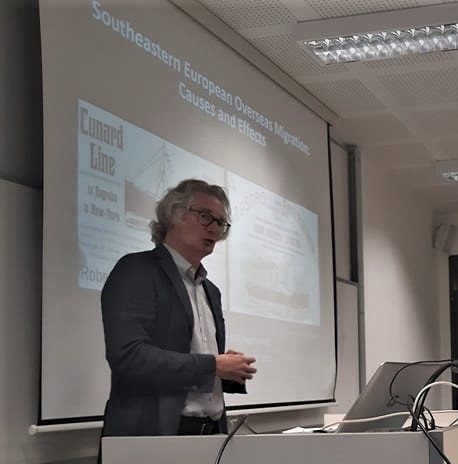The Second Corvinus Research Seminar Was Organized by the Institute of Communication and Sociology

The Institute of Communication and Sociology took the opportunity provided by the Research Management Office of Corvinus University of Budapest to organize their Corvinus Research Seminar.
The invited speaker at the event was Professor Ulf Brunnbauer, Academic director of the Leibniz Institute for East and Southeast European Studies, Chair of History of Southeast and Eastern Europe at the University of Regensburg. The Research Seminar event series was made up of open lectures and seminars held between September 20-30, 2021. The lectures were not only attended by the faculty members and the students of Corvinus but it was also followed online from the United States, Germany, Kazakhstan and Croatia by scholars and interested parties.
The Research Seminar was another step of a successful long-established research collaboration as Professor Ulf Brunnbauer and Associate Professor Attila Melegh of the Institute of Communication and Sociology have cooperated in several research projects and they have an ongoing application as well. Professor Ulf Brunnbauer has also been an active member of the Karl Polanyi Research Center of Global Social Studies at Corvinus University of Budapest.
The open lecture part of the program was entitled “Southeastern Europe as a Periphery? Migration and Global Inequalities since the 19th Century”. In his lecture, Brunnbauer revisited some of the ‘classical’ arguments about ‘peripheries’, such as by Duddley Sears and Immanuel Wallerstein. The three-part research seminars were a small series of consecutive lectures, which highlighted important dimension of the Southeast European experience with economic migration since the late 19th century. One of the most important arguments was that in all three lectures the importance of the state in shaping, controlling, and regimenting out-migration was stressed; and state intervention also lead to new social practices that try to bypass, undermine, or overcome state rules (and state borders).
The first lecture focused on so-called emigration agents and their business during the great overseas emigration from Southeastern Europe. The second lecture looked at a longue-durée analysis of diaspora policies by Southeast and Central European governments, starting with the Kingdom of Hungary and Croatia before the First World War. The last lecture focused on domestic migration and its importance for socialist industrialization, focusing on Bulgaria and the less known case of Albania.
As an outcome of this seminar a decision was made on a joint publication which will further increase the Institute’s publication performance. In conclusion it can be stated that the seminar promoted research activity within the Institute and served as an introduction into historical sociological methods.